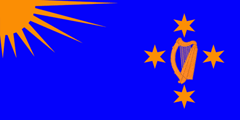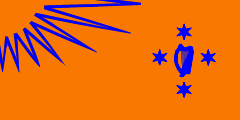Guereintia
National Flag | |
Commissioner General's Flag | |
| Languages | |
| Official | Gaeilg |
| Other | Brithenig |
| Capital | Melbroin |
| Commissioner General | Dewidd de Kretser |
| First Minister | Stían Barakat |
| Area | - |
| Population | - |
| Currency | Guereintian Oversea Líre |
| Organizations | Commonwealth of Nations |
The current Province of Guereintia (Gaelic: Tír Ghearoinn) started out as the southernmost part of the colony of New South Cambria and gained its independence from it only in the 20th century.
Economy
The province's revenues come mainly from mining (brown coal, petrol, gas, gold, gypsum and silica) and tourism.
Politics
Ireland and Guereintia have what would be best described as a 'special relationship'. It began its existence as a Kemrese colony, but was always a de facto Irish colony. The current status of Guereintia reflects that.
After Ireland gained its independence, this historical relationship was formalised as a kind of republican personal union, with both countries sharing a head of state and Guereintia becoming a de jure dominion of Ireland. Both countries are fully independent of each other, but share common citizenship and it's possible for people to move between both countries freely, just as long as they declare themselves for tax in their country of residence. Also, politicians from each country have the right to address the parliament of the other. Guereintians vote for the Irish President, but the offices of Commissioner General (the de facto head of state, officially the President's representative in Guereintia) and the First Minister are elected by Guereintians and Irish resident there. In addition, politicians from each country have the right to address the parliaments of the other, and by convention the lower houses of the parliaments exchange a number of members each year.
Culture
The province is famous for its quaint Irish culture, its Múmba (English: Moomba, festival) taking place each year in Melbroin and for its rugby, hurling and netball leagues. It can be reached by using its airline, Ansett.
History
Follows a small list of important dates:
| Period | Events |
|---|---|
| 1803 | Foundation of the Cambrian penal colony of Ua Suilamhain Bay. |
| 1834-37 | The colony now houses more freemen then convicts. It is incorporated as a municipality under the name of Melbroin (Ga. Maolbron, En. Melbourne). It continues to spread outside of the city as mainly lawless territory where Squatters (Rich landowners who grabbed parcels illegally) strive. |
| 1851 | Discovery of large gold deposit near Cluns causing a gold rush. |
| 1854 | Despite being freed and allowed to stay, Irish are still legally considered second class citizens leading to a revolt lead by Gearoinn Uí Chonaill. Though the revolt failed, Uí Chonaill would continue harassing the authority for the next two decades helped by his band of bushrangers. |
| 1862 | Arrival of the Selectors, people who bought lands held until now by Squatters. Small battles follow between the two groups. |
| 1863 | Foundation of the first reserve for displaced aboriginals. |
| 1872 | The Cambrian colonial government established a form of limited public education with basic subjects (reading, writing, and arithmetic) being free but any others having to be paid for. |
| 1908 | Discovery of coal helping to renew the economy of the district. |
| 1923 | The referendum for independence as a colony of Ireland is passed. Melbroin and the surrounding Bá Philib (Port Phillip) District is renamed Guereintia after the rebel leader and folk hero. |
| 1973 | The vote is extended to include every adult citizen of the province. Up to this date, only landowners had that right. |

